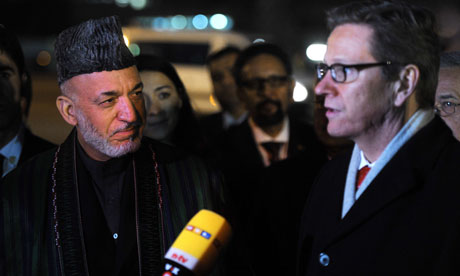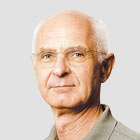Nato must rectify the errors it has made in Afghanistan
Talks in Bonn today need to address Pashtun marginalisation and not support an indefinite stay of American troops

Hamid Karzai, is met by the German foreign minister, Guido Westerwelle, on his arrival at the Bonn conference. Photograph: Patrik Stollarz/AFP/Getty Images
Monday's great Afghanistan jamboree in Bonn has been overshadowed by the latest row between Washington and Pakistan. After the killing of 24 Pakistani soldiers by Nato air strikes, the government in Islamabad refused to let its foreign minister attend. The real problem, however, is the conference's agenda: it will not discuss how to end foreign occupation and prevent the revival of a disastrous ethnically based civil war among Afghans.
The meeting is being held on the 10th anniversary of the UN-led conference in Bonn that installed Hamid Karzai as Afghan leader after the fall of the Taliban. In 2001, expectations for a new start in a country that had known a decade and a half of war were high. And in some areas, progress has been made. A UN report last week shows improvements in health, with a rise in life expectancy and a sharp fall in infant mortality. There have been large increases in the number of children attending school.
But security remains the top priority for Afghans, and the gap between the reality of 2011 and the expectations of 2001 is huge. Much of the blame goes back to the original Bonn conference. Tajik and Uzbek warlords assumed the major role in the Afghan government and the largest ethnic community, the Pashtuns, felt marginalised. Karzai being a Pashtun made little difference, since many saw him as at best a prisoner of the warlords and at worst a US puppet.
The widespread sense of exclusion among Pashtuns was a key factor in the resurgence of the Taliban. The corruption of the government and the appointment of equally corrupt local and provincial officials after the Taliban's defeat added to popular unrest. When the US added tens of thousands of troops in response to incipient resistance, the shift only provoked more Pashtuns to oppose foreign occupation.
The focus should be on correcting those mistakes. Nato policy, which the conference is almost certain to endorse, is to continue the war by other means and with other troops. US and British troops will gradually hand their garrisons over to Afghans, the aim being that they should take the lead in fighting the Taliban after 2014. Meanwhile, the US and Karzai are negotiating a separate deal to keep tens of thousands of US troops in the country as trainers and advisers after 2014, while relying for fighting increasingly on air power and drone strikes rather than infantry assaults.
This is misguided. The only strategy that has a chance of ending the war is to engage in talks with the insurgency and reverse the marginalisation of the Pashtun. Guido Westerwelle, Germany's foreign minister who is hosting the gathering in Bonn, came out strongly last week for such talks. "Reconciliation does not happen among friends but rather between erstwhile opponents. That is what we need to work on," he said.
Ideally, the conference will take it further. It should refrain from backing the indefinite extension of a US troop presence, since this will only maintain the Taliban's armed resistance. It should also clarify the aim of negotiations. "Talking to the Taliban" is often used as a way of splitting them into moderates and "irreconcilables" and bribing the former into surrender. It is merely war-fighting under a different name.
Genuine peace talks have to steer towards the creation of a government of national unity in which the insurgents have a place alongside other political forces. There will also have to be a new constitution that devolves most power to the provinces. This would calm the Tajiks and Uzbeks, but also reduce the significance of Kabul, and make it less of a prize to be fought over. If Bonn II can rectify the failings of Bonn I, it will be worth it. But hopes cannot be high.
